KARACHI: The murder and suspected rape of a ten-year-old girl in the Pakistani capital of Islamabad on Thursday sparked calls for police reform by the victim’s family and rights activists who say officers had delayed filing a police report when she first went missing and acted negligently in investigating the case.
Police recovered the body of Farishta Mohmand, who went missing on May 15, on Monday evening from a village on the outskirts of Islamabad. Her father Gulam Nabi recognized her from her clothes. He has told media that police delayed filing a case report, known in Pakistan as a first information report, until May 19. Police are also still investigating if Mohmand was raped and tortured before being murdered.
Firdous Ashiq Awan, Prime Minister Imran Khan’s de facto information minister, said the premier had taken notice of Mohmand’s case and ordered the suspension of police officers accused of being negligent.
The recent case has been compared to the rape and murder of six-year-old Zainab Ansari in January 2018, which sparked outrage and protests across the country.
“Farishta is no more but now we need justice and a change in the behavior of police so another Farishta may not be raped and killed,” Mohmand’s brother Abdul Qayyum told Arab News on Thursday. “Had the government swung into action at the beginning and our police report been registered on time, my sister would still be around me.”
Mohmand’s family, ethnic Pashtuns who hail from Mohmand agency in northwestern Pakistan, are among tens of thousands of families displaced by Pakistan’s war against militants in that region. They say the police officials who dealt with their daughter’s case treated them “like animals.”
“We hold the police responsible for her murder as they didn’t let us enter the police station when my sister went missing in the evening on May 15,” Qayum told Reuters.
Farishta’s father Nabi told the BBC that when he tried to report his daughter missing, police tasked him with carrying out chores for them around the police station for several days, including cleaning their offices and bringing them food for their dinner.
On Wednesday, a case of negligence was formally registered against several police officials, and the chief of the police station with jurisdiction in the case, Muhammad Abbas Rana, was suspended.
But Rana has defended his and his officers’ conduct, saying police had pursued the case and interviewed the family and neighbors on May 16.
Mohmand’s father alleges Rana had initially refused to register a case, telling him his daughter might have “eloped with someone of her own free will.” Rana denies this.
Social activist and lawyer Samar Minallah, who helped Mohmand’s family finally get a case report filed, said a change in “mindset” among police officers was the need of the hour.
“A misogynist police officer, instead of helping Farishta’s father, told him his daughter must have eloped with someone,” she said. “This mindset prevails everywhere in our society.”
On Thursday, Awan, the PM’s adviser on information, visited Mohmand’s family and assured them that justice would be served.
“PM Khan has declared the [police] system responsible for delay in justice to the family,” she told media after the visit. “To stop such incidents, we will have to remove lacunas in the laws.”
On Wednesday night, the spokesman for the Pakistani military said the army would “provide any support” to bring Mohmand’s murderers to justice.
“We must rise and join to protect our future generations from vile and despicable elements who prey on vulnerable children,” Major General Asif Ghafoor said in a Twitter post.
Ten-year-old’s murder, suspected rape fuel calls for police reform in Pakistan
Ten-year-old’s murder, suspected rape fuel calls for police reform in Pakistan
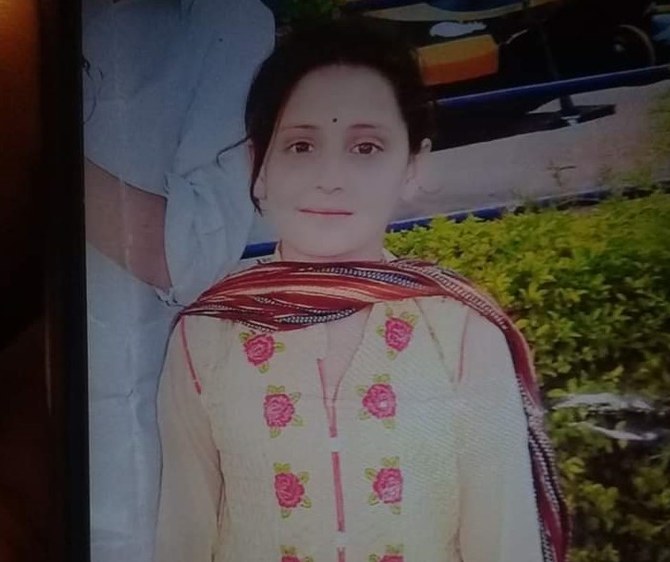
- Victim Farishta Mohmand’s family says police ignored them when they tried to report her missing on May 15
- Police case finally filed on May 19, prime minister orders suspension of police officers accused of negligent behavior
‘Shares on fire’: Pakistan’s key stock index nears 73,000 level after hitting another historic high
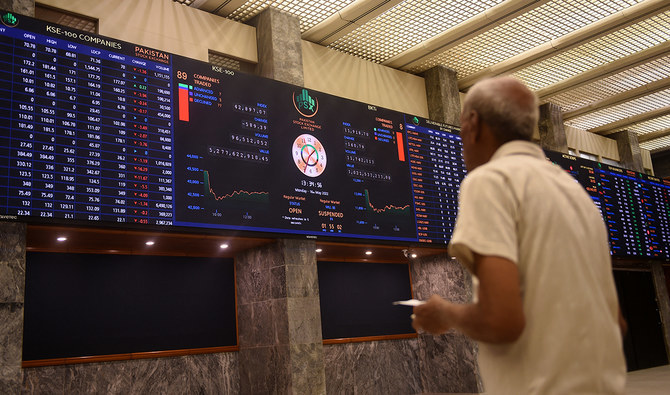
- Analysts say the bullish sentiment owes to IMF talks and optimism around Saudi investment, key policy rate cut
- The benchmark KSE100 index has surged by 8,081 points since January, gaining about 80% in US dollar terms
KARACHI: Independent financial experts in Pakistan said on Friday the country’s equity market was on fire as stocks hit another all-time high of 72,739 points amid euphoria surrounding the government’s negotiations with the International Monetary Fund for another loan along with possible Saudi investment and interest rate cut optimism.
The benchmark KSE100 index ended the weekend trading session with a gain of 771.7 points despite a relative decline in the morning. However, the market rebounded in the second half and soared to a new record high, closing at the 72,739 level.
The prevailing positive momentum began at the beginning of the year, making the KSE100 gain 8,081 points since January.
“Pakistan’s share market is on fire,” commented Muhammad Sohail, CEO of Topline Securities. “It is hovering around the 73,000 mark and still soaring.”
Sohail said Pakistani stocks were “leading the pack” with nearly an 80 percent gain in US dollar terms over the past year, maintaining their number one position.
The market on Friday saw selling pressure in the morning but recovered in the second half, mainly due to the fertilizer and banking sectors.
“Initial pressure in the morning session was mainly due to the rollover week,” said Sheheryar Butt, Portfolio Manager at Darson Securities. “Later, the fertilizer sector led the buying spree, helping with the market recovery.”
Other sectors that contributed to the highest ever close included commercial banks, cement and the power sector since they collectively reversed the previous negative close and created a more bullish trend.
“Foreign inflows, a stable rupee, speculation ahead of the central bank policy rate decision on April 29, and firm IMF new loan talks played a key role in the record close,” said Ahsan Mehanti, CEO of Arif Habib Corporation.
The KSE100 index has gained 5.4 percent on a week-on-week (WoW) basis, with many attributing this positivity in the market to investor expectations of an interest rate cut in the upcoming monetary policy meeting on Monday.
The economic indicators also played a major role in the bullish trend of the stock market, particularly the current account number for the month of April which showed a 9-year-high surplus of $619 million.
Additionally, media reports that Prime Minister Shahbaz Sharif was going to Saudi Arabia where he would request the kingdom to expedite investment in Pakistan’s oil, gas, and mining sectors also kept the bullish sentiments alive.
“Investors expect that Pakistan’s prime minister will speed up the investment of $5 billion,” Butt said. “If he brings any good news, the market will see it positively.”
The stock market is also expecting that after keeping the policy rate high at 22 percent since June 27, 2023, the central bank will make some changes in its monetary policy statement next week. “Expectations are high this time,” he continued. “The interest rate can come down by 50 to 100 basis points.”
Pakistani stocks have largely witnessed a bullish trend after the country secured $3 billion in short-term financing in July last year to stave off sovereign debt default.
The government is now expecting the final disbursement of $1.1 billion of IMF financing after the approval of its executive board.
A new IMF program being negotiated by the authorities has also led to positive sentiment in the capital market and can lead to another round of bullish spells if and when it materializes.
Ex-PM Khan’s party stages nationwide protest against alleged rigging, vows to continue until mandate restored
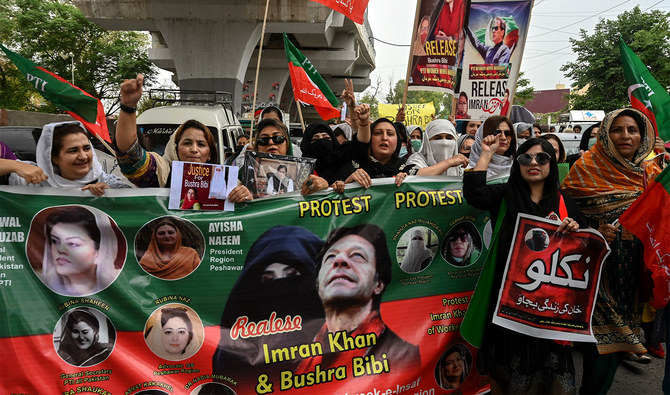
- The party says the April 21 by-elections were manipulated by the authorities in favor of its political rivals
- Its leaders have promised to reclaim their ‘stolen’ mandate by protesting for democracy and rule of law
ISLAMABAD: Jailed former prime minister Imran Khan’s Pakistan Tehreek-e-Insaf (PTI) party on Friday held nationwide protests against alleged rigging and vote fraud in by-polls held on April 21 over about two dozen national and provincial assembly seats, vowing to continue until its mandate was restored.
PTI leaders believe election results were manipulated in favor of their political rivals in the recent contest after already rejecting the outcome of the February 8 national polls. The party complained of harassment and state crackdown soon after the downfall of its administration in a no-trust vote in April 2022.
Khan has now directed his party from a high-security prison in Rawalpindi, where he has spent several months after being incarcerated last August, to protest against the rigging until its mandate is restored.
“It will not end here,” Shoaib Shaheen, a PTI leader who spearheaded a protest rally in Islamabad, told Arab News. “We held our peaceful protest demonstration today despite police’s harassment and threats to arrest the workers and leadership.”
Hundreds of male and female protesters responded to the PTI’s protest call in different cities including Karachi, Lahore and Faisalabad. The demonstrators were carrying the party flags and Khan’s portraits, demanding his release from the jail. Some of them were also wearing Khan’s face masks to express solidarity with him.
The PTI has already formed a six-party opposition alliance for a nationwide movement against the alleged vote fraud. The alliance held its first protest gathering in Pishin, Balochistan, earlier this month and announced next major public gatherings in Karachi and Faisalabad.
“The nationwide protests would continue until our mandate is restored,” Shaheen said. “This is not just a protest but movement for restoration of democracy and rule of law in Pakistan.”
The party maintained it had won over 180 National Assembly seats in the February 8 polls, but its mandate was just reduced to 90 seats. It also complained of being denied its due share in the reserved seats for women and religious minorities in parliament since all of its candidates had contested as independents after the Supreme Court took away the party’s iconic symbol of a cricket bat days ahead of the national polls.
“We are being denied all our democratic, legal and even basic human rights,” Shaheen said. “All Pakistanis should join us in the movement for restoration of political and economic stability in the country.”
The PTI delegations have frequently been denied by the sitting government.
Prior to the Friday protest, the Islamabad Capital Territory police imposed Section 144 of the Criminal Procedure Code (CrPC), preventing large gatherings to ensure maintenance of public order.
“Strict action will be taken against those who violate the law,” the police said in a social media post. “Blocking of roads and disruption of normal life will not be tolerated. The law is equal for all and action will be taken against violation.”
Global logistics giant shows interest in developing Pakistan’s first green transshipment terminal
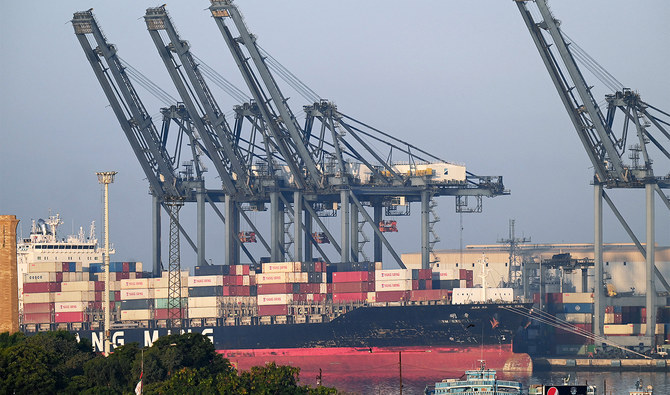
- APM Terminals sent a delegation to meet Pakistani officials and discuss the modernization of its ports
- The integrated container logistics company also develops and operates ports in countries across the world
ISLAMABAD: A delegation from a leading logistics company, A.P. Moller-Maersk (APM) Terminals, expressed interest in developing the first transshipment terminal in Pakistan while holding a meeting with Prime Minister Shehbaz Sharif on Friday.
Maersk is an integrated container logistics company operating in 130 countries. APM Terminals has been developing and operating advanced ports and container terminals for over half a century and has 60 strategically located ports and container terminals around the globe and several more in development.
The company delegation arrived in Pakistan earlier this week to discuss the possibility of developing and modernizing the South Asian nation’s ports and held separate meetings with Finance Minister Muhammad Aurangzeb and Minister for Maritime Affairs Qaiser Ahmed Sheikh.
“The prime minister expressed interest in cooperation between Pakistan and Denmark in the fields of agriculture and environment-friendly energy projects,” Radio Pakistan reported after Sharif’s meeting with the delegation led by the company CEO Keith Svendsen.
“Svendsen expressed satisfaction on the investment and business friendly policies of Pakistan,” it added. “He showed interest in the first green transshipment terminal of Pakistan in Karachi.”
The construction of the project would allow large cargo ships to utilize the Karachi port, helping the country earn greater revenue.
Previously, the country’s finance minister told the delegation Pakistan was keen to explore future projects and investments with APM, especially in the maritime sector.
“The government is fully committed to facilitate an environment conducive to business and investments,” he told them.
Svendsen and his delegation also met the maritime affairs minister on Thursday and discussed investment prospects in Pakistan’s ports and terminals sector.
“The delegation head highlighted Moller-Maersk’s prominent global position and its robust relationship with Pakistan, which reflects a market share of approximately 20 percent in containerized import-export activities,” Radio Pakistan said.
“Recognizing the immense growth potential, Keith Svendsen proposed investments to enhance integrated supply chain solutions, including the upgrading of ports and logistics infrastructure. The delegation pledged support for the advancement of maritime affairs in Pakistan and for nurturing a skilled workforce in this sector.”
On Monday, Pakistani and United Arab Emirates (UAE) officials performed the groundbreaking of a $175 million Bulk and General Cargo terminal as part of a new 25-year concession agreement signed between AD Ports Group and Karachi Port Trust (KPT) in Feb. 2024 to outsource operations of the terminal.
Under the terms of the agreement, Karachi Gateway Terminal Multipurpose Limited (KGTML), a joint venture between AD Ports Group, as a majority shareholder, and Kaheel Terminals, a UAE-based company, will develop, operate and manage the Bulk and General Cargo Terminal, berths 11 to 17 at Karachi Port’s East Wharf.
Pakistan extends Afghan refugee cards until June 30 amid deportation drive
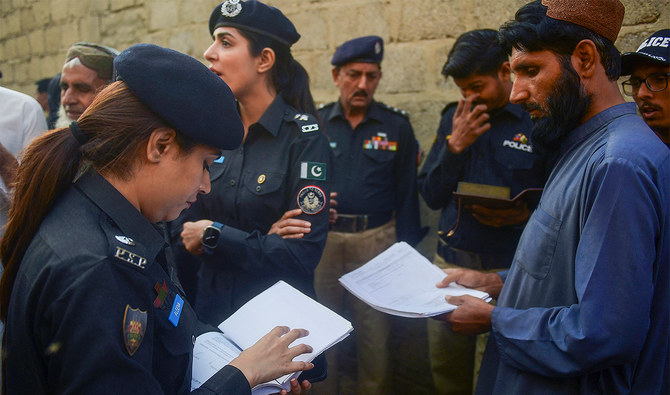
- The drive targeting ‘illegal immigrants,’ mostly Afghan nationals, was launched last year amid security concerns
- The Pakistan government says the POR cardholders will be repatriated to Afghanistan in the third deportation phase
ISLAMABAD: The Pakistan government on Friday approved the extension of Proof of Registration (POR) cards for Afghan refugees for another two months amid an ongoing deportation drive against unregistered foreigners in the country.
POR cards are identification documents issued by Pakistani authorities to Afghan refugees. These cards serve as official recognition of the refugees’ legal status in the country, allowing them to access various services such as education, health care and banking.
The Pakistan government extends these cards on a periodic basis, often depending on the political and security situations involving both countries. The extension of these cards is typically subject to review by the Pakistani government, in consultation with international organizations like the United Nations High Commissioner for Refugees (UNHCR).
“The federal cabinet has approved the extension of the validity of Proof of Registration cards for Afghan refugees from April 1, 2024, to June 30, 2024, on the recommendation of SAFRON [the Ministry of State and Frontier Regions],” announced an official statement issued after the cabinet meeting.
“The cabinet was informed that this extension would allow POR cardholders to benefit from facilities such as schools, bank accounts and other services in Pakistan,” it added. “These POR cardholders will be sent back to their home countries in the third phase of the program for repatriating foreigners residing illegally in Pakistan.”
Pakistan initiated a deportation drive targeting “illegal immigrants,” predominantly Afghans, late last year, citing security concerns amid a spike in militant attacks.
The move stirred unease among registered Afghan refugees, many of whom pointed out they were anxious about their uncertain future.
Pakistani officials have attributed several lethal attacks on both security forces and civilians to Afghan nationals, expressing their commitment to repatriate all Afghan refugees, including many born in Pakistan to families who settled during the 1980s following the Soviet invasion.
The Afghan authorities in Kabul have objected to the deportation drive, disputing that Afghan nationals had any role in the ongoing security deficit in Pakistan.
They have also maintained that Pakistan should have consulted them over the issue and given more time to Afghan nationals before sending them back to their country.
Pakistan PM to attend WEF meeting in Riyadh from April 28-29 — foreign office
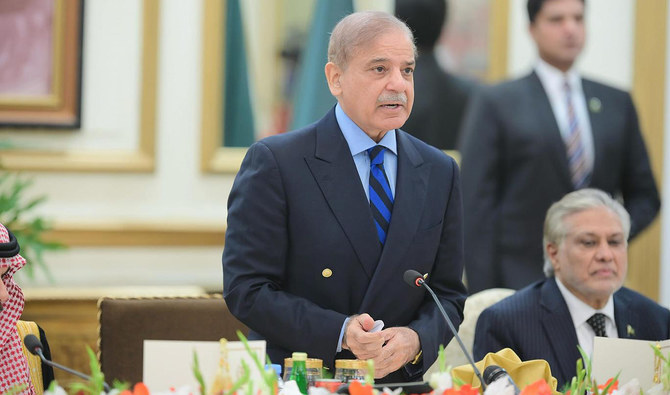
- PM Sharif is expected to discuss inclusive growth, regional collaboration and energy issues at the gathering
- He will also attend the Islamic Summit Conference in Gambia on May 4 to discuss Islamophobia and Palestine
ISLAMABAD: Prime Minister Shehbaz Sharif is scheduled to visit Saudi Arabia on the invitation of Crown Prince Mohammed bin Salman to attend a two-day World Economic Forum (WEF) meeting in Riyadh starting April 28, the foreign office of Pakistan said on Friday.
The two countries share cordial relations and have witnessed high-level official exchanges in recent years to further consolidate their ties, with Saudi foreign minister Prince Faisal bin Farhan visiting Pakistan earlier this month to discuss a spectrum of issues with the administration in Islamabad.
Prior to that, the Pakistani prime minister met the Saudi crown prince in Makkah to discuss the kingdom’s commitment to expedite its investments worth $5 billion.
“Prime Minister Muhammad Shehbaz Sharif and Foreign Minister Mohammad Ishaq Dar will attend the World Economic Forum Special Meeting on Global Collaboration, Growth and Energy to be held in Riyadh, Kingdom of Saudi Arabia, from 28-29 April 2024,” foreign office spokesperson, Mumtaz Zahra Baloch, said during her weekly media briefing.
“They have received the invitations from HRH Muhammad bin Salman bin Abdulaziz Al-Saud, Crown Prince and Prime Minister of the Kingdom of Saudi Arabia and Professor Klaus Schwab, the Founder and Executive Chairman of the World Economic Forum,” she continued.
Baloch said the occasion would allow the Pakistani delegation to interact with foreign leaders and heads of international organizations.
“The high-level participation in the Forum will afford an important opportunity to present Pakistan’s priorities specifically in global health architecture, inclusive growth, revitalizing regional collaboration and the need for striking a balance between promoting growth and energy consumption,” she added.
The prime minister will also attend the 15th session of the Islamic Summit Conference organized by the OIC on May 4-5 in the Gambian capital of Banjul to discuss a variety of regional and global issues, including Palestine, Islamophobia, climate change and the status of minorities, state-run APP reported.
The session will be held under the slogan “Enhancing Unity and Solidarity through Dialogue for Sustainable Development,” according to a press release issued by the OIC General Secretariat.
The Islamic Summit Conference attended by Sharif will be preceded by a preparatory meeting of senior officials on April 30 and May 1, who will discuss the documents of the session and submit a report to a preparatory meeting of the Council of Foreign Ministers (CFM).
“The preparatory CFM meeting will be held on May 1-2 to consider the results of the senior officials meeting and in turn, submit its report to the Summit,” the OIC said.
“Leaders of the member states will discuss the political issues of the Islamic world, most notably the Palestinian cause, and the economic, humanitarian, social and cultural issues, in addition to the issues of youth, women, family, science and technology, information, Muslim communities and minorities in non-OIC member states, and legal matters,” the OIC said.
The Summit will also tackle issues related to hate speech and Islamophobia, the promotion of dialogue, climate change and food security.
“The 15th session will issue a final communique that includes the OIC positions on the issues submitted to the Summit, a resolution on Palestine and Al-Quds Al-Sharif, and the Banjul Declaration,” the OIC added.
The Islamic Summit is a principal organ of the OIC focused on the formulation, development, and implementation of decisions made by 57 member states. The Summit is attended by concerned heads of state such as prime ministers, presidents, emirs and other equivalent heads.












